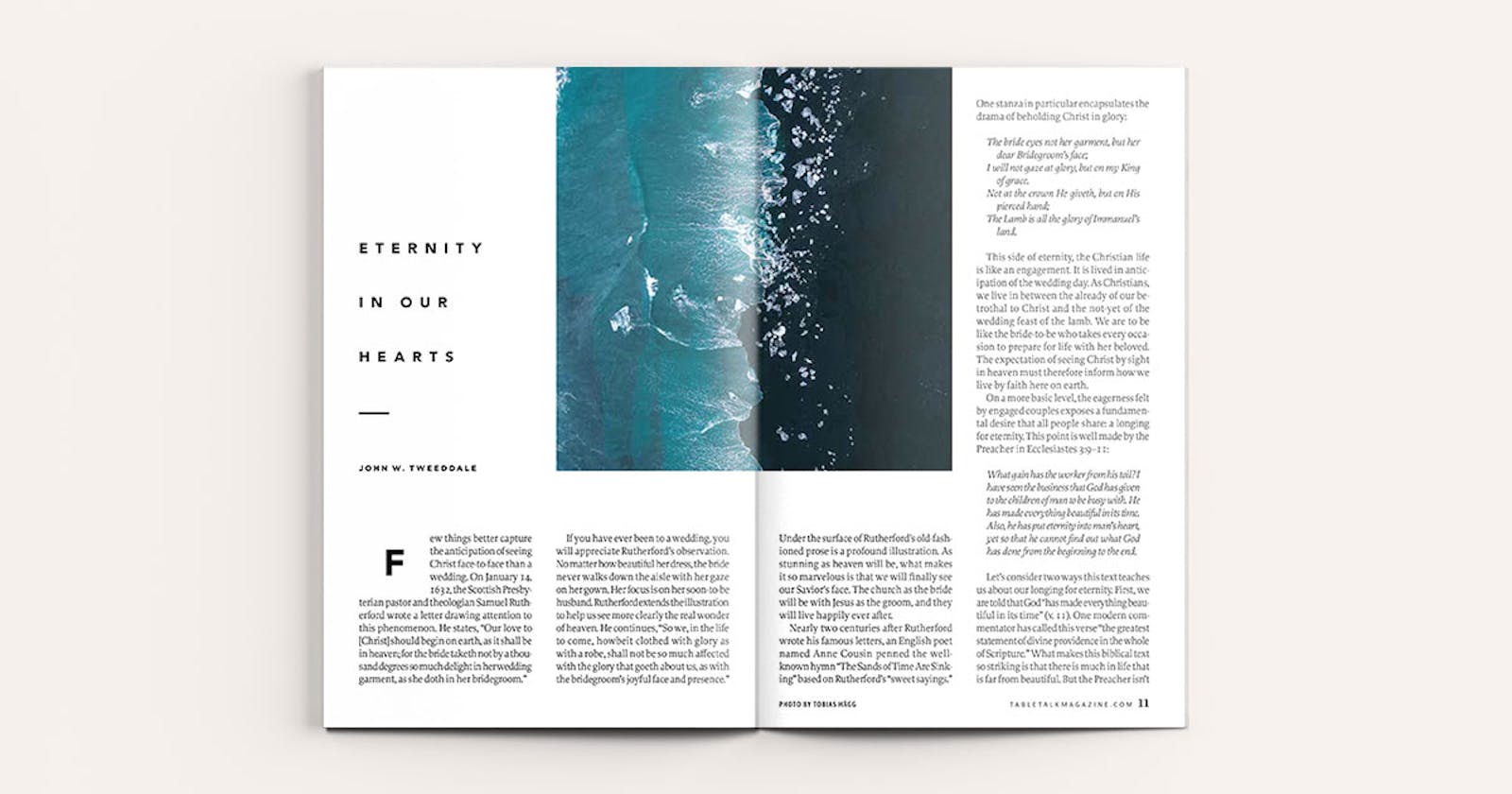
Request your free, three-month trial to Tabletalk magazine. You’ll receive the print issue monthly and gain immediate digital access to decades of archives. This trial is risk-free. No credit card required.
Try Tabletalk NowAlready receive Tabletalk magazine every month?
Verify your email address to gain unlimited access.
Few things better capture the anticipation of seeing Christ face-to-face than a wedding. On January 14, 1632, the Scottish Presbyterian pastor and theologian Samuel Rutherford wrote a letter drawing attention to this phenomenon. He states, “Our love to [Christ] should begin on earth, as it shall be in heaven; for the bride taketh not by a thousand degrees so much delight in her wedding garment, as she doth in her bridegroom.”
If you have ever been to a wedding, you will appreciate Rutherford’s observation. No matter how beautiful her dress, the bride never walks down the aisle with her gaze on her gown. Her focus is on her soon-to-be husband. Rutherford extends the illustration to help us see more clearly the real wonder of heaven. He continues, “So we, in the life to come, howbeit clothed with glory as with a robe, shall not be so much affected with the glory that goeth about us, as with the bridegroom’s joyful face and presence.” Under the surface of Rutherford’s old-fashioned prose is a profound illustration. As stunning as heaven will be, what makes it so marvelous is that we will finally see our Savior’s face. The church as the bride will be with Jesus as the groom, and they will live happily ever after.
Nearly two centuries after Rutherford wrote his famous letters, an English poet named Anne Cousin penned the well-known hymn “The Sands of Time Are Sinking” based on Rutherford’s “sweet sayings.” One stanza in particular encapsulates the drama of beholding Christ in glory:
The bride eyes not her garment, but her dear Bridegroom’s face;
I will not gaze at glory, but on my King of grace.
Not at the crown He giveth, but on His pierced hand;
The Lamb is all the glory of Immanuel’s land.
This side of eternity, the Christian life is like an engagement. It is lived in anticipation of the wedding day. As Christians, we live in between the already of our betrothal to Christ and the not-yet of the wedding feast of the lamb. We are to be like the bride-to-be who takes every occasion to prepare for life with her beloved. The expectation of seeing Christ by sight in heaven must therefore inform how we live by faith here on earth.
On a more basic level, the eagerness felt by engaged couples exposes a fundamental desire that all people share: a longing for eternity. This point is well made by the Preacher in Ecclesiastes 3:9–11:
What gain has the worker from his toil? I have seen the business that God has given to the children of man to be busy with. He has made everything beautiful in its time. Also, he has put eternity into man’s heart, yet so that he cannot find out what God has done from the beginning to the end.
Let’s consider two ways this text teaches us about our longing for eternity. First, we are told that God “has made everything beautiful in its time” (v. 11). One modern commentator has called this verse “the greatest statement of divine providence in the whole of Scripture.” What makes this biblical text so striking is that there is much in life that is far from beautiful. But the Preacher isn’t unaware of the ugliness that pervades the world. His question in verse 9 echoes the curse pronouncement in the garden of Eden: “What gain has the worker from his toil?” This is not merely a rhetorical question that is detached from the pressures of real life experience (see 1:3). The apparent futility of hard work with little gain is something he has witnessed firsthand. “I have seen the business that God has given to the children of man to be busy with” (3:10).
To be clear, the biblical record affirms the dignity of work. Before the fall, Adam and Eve were commanded to execute their duties with the promise of being fruitful (Gen. 1:28–31; 2:15–17; see Eccl. 3:13). But after the fall, work is toilsome (Gen. 3:17–19). We no longer perform our tasks in the lush environs of a garden but in the harsh conditions of a wilderness filled with thorns and thistles, failure and frustration. As the Preacher laments in Ecclesiastes 2:23, “Work is a vexation.” When we face hardship in our careers, injustice in the workplace, and defeat in completing assignments, we are confronted with the painful truth that this fallen world will never yield lasting gain. Vocational dissatisfaction reminds us that we were made for something greater than that which our hobbies and careers can offer.
But there is hope. We are told that God has made everything beautiful in its time. The “everything” in Ecclesiastes 3:11 harks back to the “everything” in verse 1: “For everything there is a season, and a time for every matter under heaven.” That life is lived under the watchful care of a sovereign Creator illumines our understanding of everything. In light of His providence, we learn that there is a time for birth and death, for planting and gathering, for mourning and dancing, for war and peace. Over all these things, God is in control. The beauty is found in the discovery that God orchestrates every last detail according to His perfect design.
Ecclesiastes 3:11 is the Romans 8:28 of the Old Testament. In Romans 8:28, the Apostle Paul states, “And we know that for those who love God all things work together for good, for those who are called according to his purpose.” Notice that Paul does not say that all things are good but that all things work together for good. And what is the good? It is being conformed into the likeness of Christ (v. 29). As Christians experience the seasons of life, we can be comforted in knowing that God uses every circumstance to shape us more and more into the image of His Son.
On August 24, 1662, more than two thousand ministers were ejected from the Church of England for not conforming to the Book of Common Prayer. The day was known as Black Bartholomew’s Day, a solemn reference to when thousands of French Huguenots were massacred on the same day in 1572. One of the ejected ministers was a Puritan named Thomas Watson. In response to the Great Ejection, he wrote a short book titled A Divine Cordial, based on Romans 8:28, in order to comfort Christians undergoing suffering. He observed that “the best things and the worst things, by the overruling hand of the great God, do work together for the good of the saints.” It is undeniable that this world is often grim and filled with heartache. But God beautifully uses both joys and sorrows to transform us as Christians into the likeness of Christ. Disappointments have a way of making us long even more to be with Him.

Second, we are told that God “has put eternity into man’s heart” (Eccl. 3:11). These words anticipate the opening of Augustine’s Confessions, where he states: “To praise You is the desire of man, a little piece of Your creation. You stir man to take pleasure in praising You, because You have made us for Yourself, and our heart is restless until it rests in You.” Both the ancient Preacher and the church father affirm that we are created with a knowledge of God and a longing for eternity. Whereas Augustine draws attention to the restlessness we experience apart from knowing God in Christ, the Preacher in Ecclesiastes makes a slightly different point. By emphasizing the futility of life under the sun, he pushes us to recognize our innate awareness of eternity.
Notice how much the Preacher says he perceives about the ways of God. He understands that God gives work to men as a gift (Eccl. 3:10, 13), that God makes everything beautiful in its time (v. 11a), that God puts eternity into man’s hearts (v. 11b), that God’s purposes are inscrutable (v. 11c), that God’s plans endure forever (vv. 14–15), and that God will judge the righteous and the wicked (vv. 16–22). In short, the Preacher knows that God’s ways are beautiful, incomprehensible, and eternal. Although we are finite and fallen creatures, God has given us the capacity to discern that history has a purpose, even if we are unable to understand fully “what God has done from the beginning to the end” (v. 11). Being confronted with our finitude should increase our dependence on God. We are to live our lives from the vantage point of eternity.
Sin, however, distorts this perspective. We no longer treat work as a gift from God but as a platform for personal greatness. Time is seen not as something beautiful that should be redeemed but as something inconsequential that can be squandered. History is understood not as the arena of God’s providential rule but as the playground for the powerful to prey on the weak. And eternal life is not to be desired but to be mocked by those who only live for the moment. Ecclesiastes teaches us that such fatalism is futile. We are made to know God. Nothing apart from eternity with Him will satisfy our deepest longings.
The good news is that Christ provides the way for sinful people to dwell in the presence of God forever. As the Apostle Peter states, “For Christ also suffered once for sins, the righteous for the unrighteous, that he might bring us to God” (1 Peter 3:18). This eternal hope is what we live for. As pilgrims who are traveling from this world to the next, we wake up each morning eagerly awaiting the return of our King. We recognize that every Lord’s Day is a foretaste of eternity. And for the rest of the week, we punch our time clocks knowing that even our toils are being used by God to prepare us for Immanuel’s Land.
On the morning of Black Bartholomew’s Day in 1683, William Payne went to bid his longtime friend John Owen farewell. Payne also brought news that Owen’s last book was soon to be published. Owen memorably replied:
I am glad to hear that that performance is put to the press; but, O brother Payne, the long looked for day is come at last, in which I shall see that glory in another manner than I have ever done yet or was capable of doing in this world!
Owen’s dying testimony was to remind his congregation of eternity. He wanted them to know that the only way to see Christ by sight in heaven is to first behold Him by faith here on earth.
